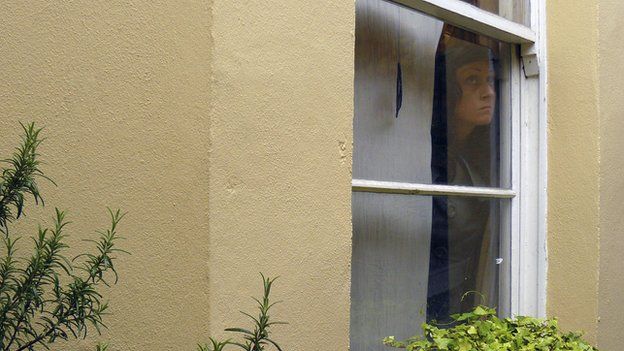Mentally ill patients sent home unsupported, experts warn
- Published

Pressure to free up mental health beds may be leaving vulnerable people at risk, says a watchdog.
Healthwatch England put in a Freedom of Information request and found psychiatric patients now spend six fewer days in hospital than in 2012-13.
The data, from 32 mental health trusts, shows average number of "bed days" per patient per year has fallen by 10%.
Healthwatch England says some patients are being discharged too early and without enough support.
Chairwoman Anna Bradley said the findings reflect a troubling picture where patients discharged from hospital often struggle to access crisis treatment at home.
"What is particularly problematic is when people leave institutions, they cannot access the support they need in the community. We have heard of cases where people have taken their own lives.
"Our concern is that people are being lost between hospitals and community services."
'Ideological drive'
Latest statistics show that in recent years, the number of suicides of patients being cared for at home has been double that of inpatients.
Prof Louis Appleby, chairman of the National Suicide Prevention Strategy advisory group, says the numbers represent a change in the nature of acute psychiatric care, with treatment increasingly being provided outside hospitals. While many patients prefer care at home, it can also represent a risk.
"The ideological drive towards services in the community and away from beds, can go too far. Eventually that drive crosses a line - and that line is safety.
"If you combine the ideological drive with pressure on resources, you have a toxic combination," he said.
In crisis
Graeme Price died after jumping from a multi-storey car park in July 2013.
He became ill shortly after taking on a new job and was diagnosed with depression and psychosis.
He was admitted to an assessment ward but discharged after three weeks back to the care of the crisis resolution and home treatment team.
His wife, Linda, said: "They hadn't done a formal care plan to decide what his treatment should be going forward. They just released him."
Ten days after being discharged, while on a shopping trip with Linda and his daughter Emily, he jumped to his death.
The coroner said he "required treatment as an inpatient but no bed was available".
South Essex Partnership University NHS Foundation Trust, which was responsible for Graeme's care said: "The circumstances surrounding Mr Price's care were thoroughly investigated, robust action was taken to address the issues identified and the learning was shared with clinical teams."
According to the most recent report from the Chief Medical Officer, Prof Dame Sally Davies, investment in the key community teams set up to replace inpatient care has fallen.
Between 2010-11 and 2011-12, investment across the three priority areas - crisis resolution, early intervention and assertive outreach - fell for the first time, by £29.3m from £520m.
Her annual report notes this is "significant" given "the co-existing reduction in bed availability".
Chris Naylor, of health think tank the King's Fund, said there was evidence that mental health was underfunded compared with physical healthcare, despite recent government promises to ensure parity of esteem.
"Mental health accounts for about 23% of the burden of disease in England, but it only receives around 11% of the funding," he said.
"If the government is serious about putting mental health care on an equal footing with physical health, then it's going to need a really serious commitment in the next parliament."
A Department of Health spokesperson said: "Commissioners are expected to give a real-terms funding increase to mental health this year.
"NHS funding for mental health increased by £300m last year."
- Published5 May 2015
- Published2 May 2015